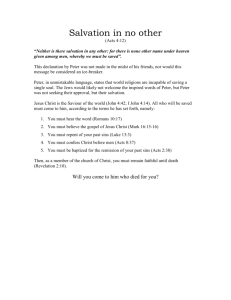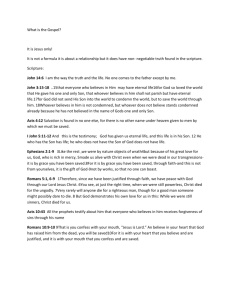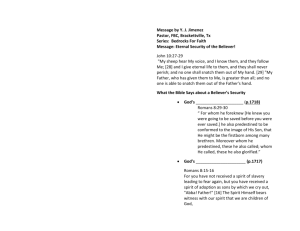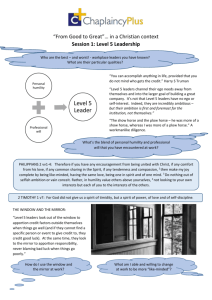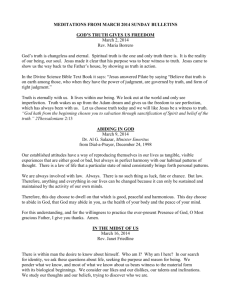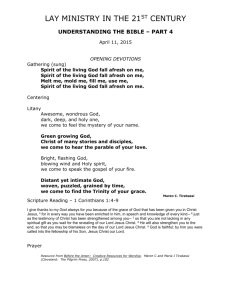Becoming an Agent of Reconciliation
advertisement
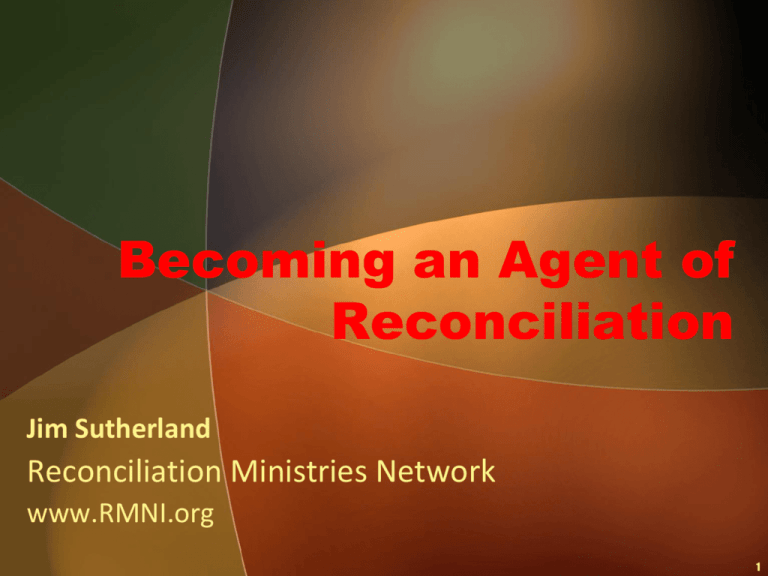
Becoming an Agent of Reconciliation Jim Sutherland Reconciliation Ministries Network www.RMNI.org 1 Why Evangelize ? 2 First, What is Evangelism? • The word comes directly from the Greek (euangelion), meaning “good news,” or “gospel.” • In 1 Cor. 15:3-5 the essential parts of the great news we share are listed: – “Christ died for our sins…he was buried” (NIV) – “he was raised on the third day, according to the Scriptures” – “he appeared” to followers—as many as 500 at once, verifying the resurrection 3 John 3:16-18 Is The Heart of God’s Great News [or bad news] • “For God so loved the world that he gave his one and only Son, that whoever believes in him shall not perish but have eternal life. 17 For God did not send his Son into the world to condemn the world, but to save the world through him. 18 Whoever believes in him is not condemned, but whoever does not believe stands condemned already because he has not believed in the name of God's one and only Son.” 4 WHAT IS A Christian Evangelist/Witness ? • A Christian witness is God’s ambassador bringing the message of salvation in Christ alone, so that unbelievers will come to love God with all their heart, soul, mind and strength, and their neighbors as themselves (that is--become disciples). 5 •A missionary is someone sent by God on a task. The word “missionary” is the Latin equivalent of the Greek “apostle,” or “sent one.” •A missionary usually goes to a different culture and ethnic group. Paul went to Gentiles, but Peter to his own people, the Jews (Gal. 2:8). Distinguishing Traits of a Missionary –A missionary is a witness, but all witnesses may not be missionaries. Jesus appeared to at least 5 women and to over 500 at one https://answersingenesis.org/jesus-christ/resurrection/the-sequence-of-christstime1. 1post-resurrection-appearances/ • – But God raised him from the dead, 31 and for many days he was seen by those who had traveled with him from Galilee to Jerusalem. They are now his witnesses to our people. Acts 13:30-31 NIV Local evangelists hopefully have the gift of evangelism • It was he who gave some to be apostles, some to be prophets, some to be evangelists, and some to be pastors and teachers…Eph. 4:11NIV. Distinguishing Traits of a Missionary First, we help them get lost. Post-moderns love to deconstruct. We need to demonstrate the need for salvation to some that sense no need for repentance. We try to tear down a frequently deficient understanding of where we stand with God. If we say that God loves us just as we are, that He could not love us more, and fail to mention that our sin separates us from God, we give a half truth, and the Good News is not as good. Some think that people already know that they sin and don’t think it’s helpful to mention sin or repentance. 8 Are Those Who Reject Jesus Really Lost ? Clearly, those who do reject Jesus will not have eternal life in heaven John 3:36b “whoever rejects the Son will not see life, for God's wrath remains on him.” John 12:48 “There is a judge for the one who rejects me and does not accept my words; that very word which I spoke will condemn him at the last day.” John 14:6 Jesus answered, “I am the way and the truth and the life. No one comes to the Father except through me.” 9 Is everyone guilty before God? Everyone sins Rom. 3:23 “for all have sinned and fall short of the glory of God”, Rom. 3:11-12 “As it is written: "There is no one righteous, not even one; 11 there is no one who understands, no one who seeks God. 12 All have turned away, they have together become worthless; there is no one who does good, not even one." John 6:44 “No one can come to me unless the Father who sent me draws him” 10 What do we do with even limited knowledge of God? Pagans suppress knowledge. They don’t accept the light already given. Romans 1:18-20 “The wrath of God is being revealed from heaven against all the godlessness and wickedness of men who suppress the truth by their wickedness, 19 since what may be known about God is plain to them, because God has made it plain to them. 20 For since the creation of the world God's invisible qualities-- his eternal power and divine nature-- have been clearly seen, being understood from what has been made, so that men are without excuse.” 11 If a person does not know God’s standards of right and wrong in the Bible, is the person guilty of trespasses? We all violate our own moral standards– thus condemning ourselves. Rom. 2:14-15 (Indeed, when Gentiles, who do not have the law, do by nature things required by the law, they are a law for themselves, even though they do not have the law, 15 since they show that the requirements of the law are written on their hearts, their consciences also bearing witness, and their thoughts now accusing, now even defending them.) No matter how simple our ethic, we will violate it, probably quickly. 12 Can a person be guilty without knowing God’s laws? Before the 10 Commandments, God held Sodom and Gomorrah and the Canaanites guilty enough to warrant total destruction. In the New Covenant: 47 “That servant who knows his master's will and does not get ready or does not do what his master wants will be beaten with many blows. 48 But the one who does not know and does things deserving punishment will be beaten with few blows. From everyone who has been given much, much will be demanded” (Luk 12:47-48 NIV) 13 What if somehow I did not sin? Everyone comes into this world condemned by Adam’s sin Romans 5:18 Consequently, just as the result of one trespass was condemnation for all men, so also the result of one act of righteousness was justification that brings life for all men. Forgiveness comes by repentance and faith in Christ Repent, then, and turn to God, so that your sins may be wiped out, that times of refreshing may come from the Lord (Act 3:19 NIV) Acts 10:43 All the prophets testify about him that everyone who believes in him receives forgiveness of sins through his name.“ 14 Are Those Who Don’t Hear Of Jesus Really Lost ? Forgiveness and salvation do not come automatically by the death of Christ on the cross. We must trust that death to pay for our personal sins. Romans 10:9-10 That if you confess with your mouth, "Jesus is Lord," and believe in your heart that God raised him from the dead, you will be saved. 10 For it is with your heart that you believe and are justified, and it is with your mouth that you confess and are saved. God in His mercy has appeared many times in dreams and visions to those who have not been evangelized. Tom Doyle, Dreams and Visions: Is Jesus Awakening the Muslim World? ISBN: 978-0849947209 15 SO, Are Those Who Don’t Hear Of Jesus Really Lost ? YES Everyone sins. We suppress what knowledge we have of God. We violate our own moral standards. We inherit the condemnation for the sin of Adam. Salvation is not universal, but particular, requiring calling upon the Lord (Rom. 10:13), personal faith and trust in Christ as our savior. On what grounds, then, could a person be saved who has not heard of Christ? 16 What Happens to the Lost? • They will pay for their own sin, resulting in conscious, eternal torment, away from God’s presence • (49) This is how it will be at the end of the age. The angels will come and separate the wicked from the righteous (50) and throw them into the fiery furnace, where there will be weeping and gnashing of teeth. (Matt. 13:49-50; 25:41; Luke 16:19-26; 2 Thess. 1:7-9; Rev. 20:10-15). “It is a dreadful thing to fall into the hands of the living God.” (Heb. 10:31, NIV). 17 If all are saved who don’t hear of Christ, the best strategy is to immediately withdraw all missionaries, so that all will be saved D. James Kennedy Worlds A, B & C, 2010 Todd M. Johnson, Kenneth R. Ross, eds., Atlas of Global Christianity, 2009, pp. 312-13, ISBN: 9780748632671 19 • World A – The unevangelized world • =2,124,216,000 as of mid-2015, or 29% of Earth’s population • World B – The evangelized non-Christian world • = 2,781,345,000 in mid-2014, or 38% • World C – The Christian world • =2,419,221,000 in mid-2015 or 33% • Source: Todd M. Johnson & Peter F. Crossing, et al, “Christianity 2015: Religious Diversity and Personal Contact”, International Bulletin of Missionary Research, January 2015, p. 29 Worlds A, B & C 20 2015 Source: Todd M. Johnson & Peter F. Crossing, et al, “Christianity 2015: Religious Diversity and Personal Contact”, International Bulletin of Missionary Research, January 2015, p. 29. 21 Christians 2,419,221,000 Muslims 1,703,146,000 Hindus 984,532,000 Nonreligious 831,267,000 Buddhists Chinese folk religionists 520,002,000 Ethnoreligionists 260,240,000 Other 152,506,000 453,868,000 World Religions by Population—Mid-2015 Source: Todd M. Johnson & Peter F. Crossing, et al, “Christianity 2015: Religious Diversity and Personal Contact”, International Bulletin of Missionary Research, January 2015, p. 29.22 Our Responsibility • In the New Testament the Son of Man came to seek and save the lost (Luke 19:10). • 14 How, then, can they call on the one they have not believed in? And how can they believe in the one of whom they have not heard? And how can they hear without someone preaching to them? 15 And how can they preach unless they are sent? As it is written, "How beautiful are the feet of those who bring good news!“ (Rom 10:14-15 NIV) • Christians are now mediators (priests) between God and unbelievers (Rom. 15:16; 1 Pet. 2:9). Why Witness ? • Proverbs 24:11 Rescue those being led away to death; hold back those staggering toward slaughter. 12 If you say, "But we knew nothing about this,“ does not he who weighs the heart perceive it? Does not he who guards your life know it? Will he not repay each person according to what he has done? Our Responsibility: Try to Rescue Theologian A.H. Strong is quoted as wondering not what will happen to the heathen who have never heard, but what will happen to the Christians because the heathen never heard. Dr. John Gerstner • “…Christianity is so intolerant, that it will bear no other religion; it seeks to overthrow every other system. If it would have admitted the claims of other religions, it would have escaped persecution. But no; it denounced every other system and mode of worship as hateful to God, and destructive to the soul. And it made every disciple a proselyter. And every one now, whether male or female, bond or free, Jew or Greek, who professes Christianity, takes upon himself or herself the obligation to convert others to Christianity.” • • Archibald .A. Alexander, quoted in Jeremy Walker, The Brokenhearted Evangelist, ISBN: 978-1601781611, p. 21. Our Part: Going • “We are under orders to devote ourselves to spreading the good news, and to use all our ingenuity and enterprise to bring it to the notice of the whole world. The Christian, therefore, must constantly be searching his conscience, asking himself if he is doing all that he might be doing in this field.” JI Packer, Evangelism and the Sovereignty of God, p. 26-27 Our Part: Diligence • Introducing a person to Christ is the most loving act possible. They meet love by meeting God and it brings new life now and eternal life later. The person should be able to discern our love, and that love enables us to probe. • Dear friends, since God so loved us, we also ought to love one another. (1Jo 4:11 NIV) • If we are loving, people will listen to hard truths from us. • “Our responsibility lies where our sovereign God has put us, in the sphere to which He has called us. It is there we are to conduct ourselves as brokenhearted evangelists and pursue our calling as Christians, embracing our vocation— whatever it may be—as those who desire and intend to make Christ known to others.” Jeremy Walker, p. 17 Our Responsibility: Love • “But how to set about the good work is what perplexes me. It seems so difficult and delicate an affair. There are so many considerations of prudence and propriety to be taken into account; so many snares into which I may fall, or mistakes which I may commit; so much risk of doing more harm than good; --I am so sensitively alive to the charge of ostentation and hypocrisy, or the appearance of hypocrisy, and see so clearly how worldly friends may be offended by injudicious zeal and the unreasonable intrusion of spiritual topics; I have such an impression of the sacredness of the ark of God, and such a shrinking dread of handling it, with the best intentions, unworthily or unwisely;--that I am rather disposed to keep silence, and leave it to more advanced Christians, experienced veterans, to vindicate God’s ways, and rebuke men’s sins, and win their souls!” Robert Candlish • https://ia802604.us.archive.org/16/items/prayerabrokenhe00candgoog/pr ayerabrokenhe00candgoog.pdf Fear of People God the Father’s Work 30 “Ordo Salutis”— The Order of Salvation—God’s Work The classic passage on this subject is Romans 8:28-30 in which the “order” is: – Foreknowledge of God (v. 29) – Predestination by God (Eph. 1:4) Fore-knowledge differs from a predetermination, which simply means to know in advance. Predestination means to “decide on beforehand, determine in advance” Friberg Lexicon – Calling of God God calls through messengers 31 “Ordo Salutis”— The Order of Salvation—God’s Work Justification I by God Cor. 6:11--“But you were washed, you were sanctified [made holy], you were justified [made righteous before God] in the name of the Lord Jesus Christ and by the Spirit of our God.” – Glorified by God—this has primary reference, it seems, to our resurrected state, spoken of as “already”—an escatological statement of the “already/not yet” (S.B. Fergueson). 32 God the Father’s Work The Father sent the Son into the world (John 5:36) to save all those the Father has given him John 6:39 “And this is the will of him who sent me, that I shall lose none of all that he has given me, but raise them up at the last day.” God draws people to Christ--John 17:2 “For you granted him authority over all people that he might give eternal life to all those you have given him.” None can come to Christ otherwise. – How does this impact your evangelism? – This humbles – This should encourage. 33 God the Father’s Work Is God unjust not to call everyone? – Rom. 9:14-20 What then shall we say? Is God unjust? Not at all! 15 For he says to Moses, "I will have mercy on whom I have mercy, and I will have compassion on whom I have compassion." 16 It does not, therefore, depend on man's desire or effort, but on God's mercy. – We all deserve hell Is. 53:6 “We all, like sheep, have gone astray, each of us has turned to his own way; and the LORD has laid on him the iniquity of us all.” (Rom. 3:23; 6:23) 34 God’s Grace and Mercy Only by God’s mercy is anyone saved (1 Cor. 7:14) Eph. 2:8 For it is by grace you have been saved, through faith--and this not from yourselves, it is the gift of God-- 9 not by works, so that no one can boast. “Grace” means “gift.” Salvation is a gift of God. Salvation is by the mercy of God – Titus 3:5 He saved us, not because of righteous things we had done, but because of his mercy. He saved us through the washing of rebirth and renewal by the Holy Spirit, 6 whom he poured out on us generously through Jesus Christ our Savior, 7 so that, having been justified by his grace, we might become heirs having the hope of eternal life. 35 • We do not know whom God is saving—only God knows. Therefore, we witness as if everyone will be saved. • Follow the promptings of the Spirit, even if uncomfortable. • Anyone who is not saved needs the Gospel. • We witness to family, spouse, fellow workers, contacts, friends, relatives, etc. Ask God for divine appointments. To Whom Do We Witness? 36 • Witnessing to your husband: – 1 Peter 3:1-4 Wives, in the same way be submissive to your husbands so that, if any of them do not believe the word, they may be won over without words by the behavior of their wives, 2 when they see the purity and reverence of your lives. 3 Your beauty should not come from outward adornment, such as braided hair and the wearing of gold jewelry and fine clothes. 4 Instead, it should be that of your inner self, the unfading beauty of a gentle and quiet spirit, which is of great worth in God's sight. To Whom Do We Witness? 37 Repentance God commands everyone to repent (which means to make a 180° turn from the life of darkness, toward the light). “In the past God overlooked such ignorance, but now he commands all people everywhere to repent. For he has set a day when he will judge the world with justice by the man he has appointed.” Acts 17:30-31 God grants the gift of repentance (Acts. 11:18) to those being saved. Acts 11:18 "So then, God has granted even the Gentiles repentance unto life." 38 Repentance Good Works We’re saved by faith, for the purpose of glorifying God (1 Cor. 10:31). Titus 3:8 gives God’s desire for new believers, just after stressing salvation by God’s mercy: “This is a trustworthy saying. And I want you to stress these things, so that those who have trusted in God may be careful to devote themselves to doing what is good. These things are excellent and profitable for everyone.” See Eph. 2:8-10 for the same progression of salvation by faith for good deeds. "Everyone who confesses the name of the Lord must turn away from wickedness.“ 2 Timothy 2:19 Therefore we stress that Christians, by the Spirit’s power (Rom. 8:13), strive to please God by good deeds. A sinner cannot please God, except by confessing sin. Once saved, we try to please God (1 Thess. 4:1). 39 The Work of God the Son 40 The Work of Christ: Sinless life Jesus came to earth specifically to save people “For the Son of Man came to seek and to save what was lost” (Luke 19:10). He resisted every temptation (Heb. 4:15) to live a completely sinless life (1 Pet. 2:22). As a spotless person (like the spotless lamb of the OT), He was qualified to make payment, as our substitute, for our sins on the cross (John 1:29; Rom. 3:23-24; 2 Cor. 5:21; 1 Pet. 2:24). So He satisfied [propitiated] God’s anger against our sins, becoming the only possible mediator between God and man (1 Tim. 2:5-6). He became our High Priest, bringing His own blood as our sacrifice (Heb. 13:11-12). 41 The Work of Christ: Death His major work was not preaching and healing, which was His earthly ministry to the Jews. It was His sacrificial death on the cross, which made salvation for anyone possible. Mark 10:45 “For even the Son of Man did not come to be served, but to serve, and to give his life as a ransom for many.” 42 The Work of Christ: Death Hebrews 10:5-10 5 Therefore, when Christ came into the world, he said: "Sacrifice and offering you did not desire, but a body you prepared for me; 6 with burnt offerings and sin offerings you were not pleased. 7 Then I said, 'Here I am-- it is written about me in the scroll-- I have come to do your will, O God.'" 8 First he said, "Sacrifices and offerings, burnt offerings and sin offerings you did not desire, nor were you pleased with them" (although the law required them to be made). 9 Then he said, "Here I am, I have come to do your will." He sets aside the first to establish the second. 10 And by that will, we have been made holy through the sacrifice of the body of Jesus Christ once for all. 43 God The Spirit’s Work 44 The Spirit’s Work: Empowerment and life LK 4:18-19 "The Spirit of the Lord is on me, because he has anointed me to preach good news to the poor. He has sent me to proclaim freedom for the prisoners and recovery of sight for the blind, to release the oppressed, to proclaim the year of the Lord's favor.“ The Spirit alone gives life to the lost (John 6:63). The evangelist cannot give life. 45 The Work of the Spirit: Conviction The Spirit convicts of sin [of not believing in Christ], righteousness [of Christ], and the coming judgment [upon Satan] (John 16:8). Without a conviction of sin, a person will not sense a need to be saved. I’ve never seen anyone come to Christ without being convicted of sin. 46 The Work of the Spirit: Fielding workers The Holy Spirit also fields workers to gather in God’s harvest of the redeemed (Luke 10:2). He does this in response to the worker’s prayer. The Apostles were instructed to wait for the power of the Holy Spirit before beginning their international ministries (Acts 1:8). So we must be filled with the Spirit to accomplish any significant evangelistic ministry. 47 The Process of “Being Saved” 48 The Evangelist’s Work 49 The Evangelist’s Confidence • God makes the evangelist to be adequate. – 2 Corinthians 3:5-6 5 Not that we are competent in ourselves to claim anything for ourselves, but our competence comes from God. 6 He has made us competent as ministers of a new covenant-- not of the letter but of the Spirit; for the letter kills, but the Spirit gives life. 50 The Evangelist’s Preparation • The evangelist needs to understand basic truths about God, Christ, the Holy Spirit and human beings. The evangelist needs to understand what salvation is and how it is clearly conveyed (Col. 4:4). If the witness is confused, confusion will result, although a person might be saved anyway. 51 Personal Evangelism is Personal • God uses all personality types to witness. – “Consider the character and gifts of Paul, Peter, John, and other men whose personalities decorate the pages of the Scriptures that they were inspired to write. Think of Isaiah, Jeremiah, or Ezekiel….Their characters were different, their constitutions were different, and so they were employed to carry messages with a different tone or emphasis.” Jeremy Walker, The Brokenhearted Evangelist, ISBN: 9781601781611, p. 51. – Some witnesses are highly confrontational. Others are full of mercy and diplomacy. Some are linear (“Four spiritual laws”), others global in approach (Soularium). You may be an extrovert or introvert. The Evangelist’s Attitude • “Since a saint’s gloom reflects unkindness on God Himself, how can we recommend His satisfying love if it does not satisfy us? The world thinks the Christian life is depressing anyway, a dry meal where very little wine of joy is tasted. Why will you confirm their deception, Christian? Why should they have your example as evidence against Jesus and His Word, which promise peace and joy to everyone who comes to the table?....They can believe it is good news when they can read it clearly in a cheerful life.” circa 1655 William Gurnall, The Christian in Complete Armour, Vol. 2, p. 258. ISBN: 0851515150 53 The Evangelist’s Preparation • 2 Corinthians 4:2 Rather, we have renounced secret and shameful ways; we do not use deception, nor do we distort the word of God. – We don’t claim that we’re taking a survey if we’re not taking one • On the contrary, by setting forth the truth plainly we commend ourselves to every man's conscience in the sight of God. – Colossians 4:4 Pray that I may proclaim [the mystery of Christ] clearly, as I should. 54 The Evangelist’s Preparation • We need to pray for boldness (Acts 28:31; Eph. 6:19-20) and the fullness of God’s Spirit (Eph. 5:18). We need to pray for love for the lost (Gal. 5:6b) and a servant’s spirit. If I feel myself to be superior to the “sinner,” that is pride (Lk. 18:11). Confess your sins, restoring the joy of your salvation (Ps. 51:1213), before instructing other sinners. 55 The Evangelist’s Preparation • We need to put on the full armor of God (Eph. 6:10-18), part of which is prayer. Part of this armor is defensive, and part offensive (the Sword of the Spirit, by which Jesus defeated Himself against Satan’s attack (Matt. 4:1-11). • Go with someone else. The work is much easier with a co-worker. • Colossians 4:5-6 Be wise in the way you act toward outsiders; make the most of every opportunity. 6 Let your conversation be always full of grace, seasoned with salt, so that you may know how to answer everyone. 56 The Work of the Evangelist: GO • How, then, can they call on the one they have not believed in? And how can they believe in the one of whom they have not heard? And how can they hear without someone preaching to them? 15 And how can they preach unless they are sent? As it is written, “How beautiful are the feet of those who bring good news!” Romans 10:14-15 57 The Work of the Evangelist: Prayer Against Fear • Ephesians 6:19-20 Pray also for me, that whenever I open my mouth, words may be given me so that I will fearlessly make known the mystery of the gospel, 20 for which I am an ambassador in chains. Pray that I may declare it fearlessly, as I should. 58 Prayer for the Spread of the Gospel and for Protection • 2 Thessalonians 3:1-2 Finally, brothers, pray for us that the message of the Lord may spread rapidly and be honored, just as it was with you. 2 And pray that we may be delivered from wicked and evil men, for not everyone has faith. 59 Prayer That We Will Actively Evangelize • Philemon 1:6 I pray that you may be active in sharing your faith, so that you will have a full understanding of every good thing we have in Christ. – Evangelists will gain a deeper appreciation of what they have in Christ, as they tell others. 60 Physicians of the Soul Jesus did not approach each person in precisely the same way. He approached the Rich Young Ruler and identified his love of money. He identified the Samaritan woman’s immorality. One He “lost,” and the other He “won.” We come to a person much as a doctor comes to a patient. We diagnose the problem before prescribing the remedy. 61 Physicians of the Soul: Probe Only a bad doctor would immediately write a prescription without hearing the symptoms. So we need first to listen and listen well to the person in order to (1 identify and then (2 begin to refute the errors the person believes. We suit the remedy to the need. We show the freedom that the Gospel provides for the particular enslavement to sin. By listening, we also earn the right to speak (James 1:19). 62 Physicians of the Soul: Spiritual scalpels 2 Cor. 10:4-5, NIV “The weapons we fight with are not the weapons of the world. On the contrary, they have divine power to demolish strongholds. We demolish arguments and every pretension that sets itself up against the knowledge of God, and we take captive every thought to make it obedient to Christ.” For this we need to use the Sword of the Spirit (Eph. 6:17). Memorized, it is more useful. 63 Physicians of the Soul: First tear down We first must destroy the elements of false beliefs before we build on the good foundation of Christ (1 Cor. 3:10-11). They need to know that their righteousness is as filthy rags (Is. 64:6). This is offensive to some. They need to know they cannot save themselves, even if they are better than others—even 99% of others. 64 Physicians of the Soul: First tear down This is painful both to the person addressed and for the evangelist. The Gospel, and the evangelist, may be rejected. The Gospel may have to be presented several times by different people before a person understands. It took me about 19 years before I grasped it, after being saved. We may plant, water, or reap (1 Cor. 3:6-8), and are rewarded according to our labor. 65 “Jesus is the Answer” —What’s the question? The unsaved ask a variety of questions. Generations may ask similar questions. “How do I get to heaven?” “How can I be delivered from bondage?” “How can I survive or be secure?” “How can I find real friends?” “How can I find love?” “How can I make sense of death and wickedness?” “How can I find peace?” 66 Sample Diagnostic Questions “Could I ask you what your idea of God is?” If we meet an atheist, we could begin with why the person is an atheist. Often it’s due to deep hurt or grief. The “problem of evil” is often the issue. God is not at fault for sin--Satan and sinners are. We could mention that it is impossible to prove a universal negative (that God is in no place, since none can be everywhere at the same time to prove it). 67 Sample Diagnostic Questions If we meet an agnostic (someone unsure of God’s existence), we could talk about natural revelation—the evidence of intelligent design in nature and the presence of a basic universal moral code. We could ask if the person has ever met someone who made a dramatic life change due to meeting Jesus. 68 More Diagnostic Questions As soon as some rapport is built, ask for the person’s first name, then use it. “Who is Jesus Christ, in your estimation? Is he the Son of God, God the Son, a good man, or a good teacher, or who?” Of course, Christology is key to salvation. If they pray, go to church and read the Bible—good, but they must confess Jesus as Lord (Rom. 10:9-10) to be saved. “If you were to die tonight and stand before God and He were to ask you, ‘Why should I let you into My heaven?,’ what would you say?” (Evangelism Explosion). Do you receive an answer focusing upon what good things the person we’re talking with has done, or is their focus upon what Christ has done for them? 69 “Does life make sense to you?” When our life is centered around God, and when we study His word, we understand life as it is meant to be lived. We learn the consequences of not living according to God’s will. Usually the Bible helps us understand life better. We learn that making something or someone else the center leads to confusion. Christians and non-Christians have given opposite answers, so it may help us to determine with whom we’re talking. 70 Another Diagnostic Question “What are you really looking for in life?” (Carl Ellis’ question). Then we fit the truths of the Gospel to show how God can and does meet that need in the proper way, and in balance with the rest of life and eternity. 71 Distractions—TV, radio, etc. ► Many will not attempt to turn down noise from a TV, etc., continuing to watch it. ► Politely say that the TV is distracting to YOU, and that YOU find it difficult to concentrate. Ask if they will MUTE or turn off the TV while you talk. If they offer to turn it off, take it. Satan will use any distraction possible—phone calls, unexpected visitors, etc. Share the gospel with the unexpected visitors too! 72 Contact Evangelism People will accept the message better if they accept the messenger. Try to dress similarly to those you’re reaching. ► Don’t be condemnatory—give the next evangelist a break! ► Try to establish rapport—a “bridge” into their life—as quickly as possible. You may not bring up the gospel for a while. Asking if they attend church is often a useful transition into spiritual issues. This IS your business, since we are commissioned by God as priests. The Spirit will often give you a creative transition. ► Giving a gift, such as a New Testament, tract or other item “opens a way” (Prov. 18:16) for the evangelist. Their response gives clues as to how receptive they might be to the gospel. After giving a NT, you might ask, “By the way, may I ask you a question?—suppose you were to die tonight…” ► 73 Street Evangelism ► Street preachers in Chattanooga, Tenn., USA made snap judgments as people walked by. According to a newspaper article*, when an “evangelist” saw two teens holding hands, he called them “fornicators.” A man with long hair was pointed out as doomed to hell for looking effeminate. ► “The real Gospel, as it should be preached, will offend some people. The Gospel will always come between the sinner and the sin they love so much, and that’s the problem.” -Evangelist Patrick O’Connell. *Adam Crisp, “Streetside Salvation,” Chattanooga News Free Press, 6/13/09, p. A1,7. 74 Gospel Presentations ► For an example of a gospel presentation for an American inner-city context, please download it at: http://www.rmni.org/urban-ministries/innercity-evangelism/evangelism-outline.html ► A color-coded Bible verse list for evangelists is at: http://www.rmni.org/teachingresources/evangelism-a-discipleship/colorcoded-verses-for-witnessing.html 75 The “Work” of the Sinner • “If you confess with your mouth, ‘Jesus is Lord’ [that he is resurrected and reigning] and believe in your heart that God raised him from the dead, [the sign Jesus gave that He was the Messiah, Matt. 12:39-40], you will be saved. For it is with your heart that you believe and are justified, and it is with your mouth that you confess and are saved. As the Scripture says, ‘Anyone who trusts in him will never be put to shame.’” Romans 10:9-10 76 The “Work” of the Sinner • Then they asked him, "What must we do to do the works God requires?" Jesus answered, "The work of God is this: to believe in the one he has sent.“ (John 6:28-29) 77 Follow-up --immediate • Immediately after a profession of faith (it is simply that—a profession—a changed life is the proof—2 Cor. 5:17), give some guidance. – Encourage finding a Bible-believing, loving church. – Note that sinning doesn’t mean we aren’t Christians (1 John. 1:9; 2:1). – Teach them about God’s armor (Eph. 6:10-18). – Show them the Lord’s prayer (Luke 11) – See this information for followup: • http://www.rmni.org/teaching-resources/evangelisma-discipleship/follow-up.html 78 Followup –Bible’s importance – Read the Bible—Gospel of John (for salvation reinforcement), Psalms (to learn to pray), Proverbs (to know how to live). Give a New Testament or Bible. The English Standard Version costs about $2 in bulk from from Crossway. Offer a modern language Bible, or you make the Bible needlessly difficult to read. It has the plan of salvation included. • A follow-up sheet can be printed from http://www.rmni.org/teachingresources/evangelism-adiscipleship/follow-up.html and given to the one professing Christ. 79 Follow-up –further contact • Get contact information from the person— address and cell phone number. Try to return within 24 hours. • On the second visit, again ask the diagnostic question of what they would say to God about why He should let them into heaven. Evangelize again if a “works” answer is given. • Pray for the person’s growth. Try to provide a ride to church if needed. Put a discipler into contact with the one professing Christ if the person is of the opposite gender. • Use “interruptions” in the Gospel presentation as a “divine appointment” to share with others who show up. 80 Who is on your heart? • Ask God for a specific opening and opportunity to witness to that person. • You may plant, water, sow, or do all three tasks (John 4:37-38; 1 Cor. 3:68). You will be rewarded for your efforts. It is God’s work to save, but ours to witness. – Hebrews 6:10 10 God is not unjust; he will not forget your work and the love you have shown him as you have helped his people and continue to help them. 81 Contextualizing the Gospel: America American Worldview ¤ Only 34% of American adults believe in moral absolutes that are independent of circumstances. ¤ Half of adults believe the Bible is without error in its principles. ¤ Just 27% believe that Satan is a “real force.” ¤ 70% believe that God is the omnipotent and omniscient ruler of the world today. “Barna Survey Examines Changes in Worldview Among Christians over the Past 13 Years,” March 6, 2009 http://www.barna.org/barnaupdate/article/21-transformation/252-barna-survey-examines-changes-inworldview-among-christians-over-the-past-13-years?q=worldview American Spirituality ¤ 84% of Americans consider themselves Christians 93% of those 57+ so profess 80% of those under 57 make that claim How does this impact evangelism? ¤ Atheists/agnostics are 11% of Americans ¤ Those “absolutely committed” to Christianity = 48% Source: George Barna, “Is America’s Faith Really Shifting?”, 2/24/03, www.barna.org American Beliefs ¤ 85% of women and 72% of men believe in the Trinity (Barna, “Americans Draw Theological Beliefs From Diverse Points of View,” 10/8/02). ¤ 42% believe that Jesus committed sins (49% of those under 38, 51% of nominal Christians, and 62% of atheists and agnostics) (Barna, 10/8/02). 40% believe 3/6/10) What Jesus lived without sin. (Barna, implication does this have for the atonement—Christ’s death on the cross? American “theology” ¤ 50% believe that anyone who “is generally good or does enough good things for others during their life will earn a place in Heaven (40% of Protestants believe this). (Barna, 10/8/02) ¤ Only 28% believe that good works will not save a person. “Barna Survey Examines Changes in Worldview Among Christians over the Past 13 Years,” March 6, 2009 http://www.barna.org/barna-update/article/21-transformation/252barna-survey-examines-changes-in-worldview-among-christians-overthe-past-13-years?q=worldview Sources of Truth ¤ 44% of American adults believe that “the Bible, the Koran and the Book of Mormon are all different expressions of the same spiritual truths.” (Barna, 10/8/02) How do the Book of Mormon and the Koran differ from the Bible? ¤ 54% believe “truth can be discovered only through logic, human reasoning and personal experience.” (Barna, 10/8/02) What are truth-sources for the Christian? Beliefs of Subgroups ¤ 90% of women, 79% of men, and 62% of Baby Busters (19-37) say religious faith is very important. Does this influence our approach? ¤ 58% of African Americans are “searching for meaning and purpose in life,” compared to whites, yet 45% are born again (Barna, 2001). Beliefs of Subgroups ¤ 10% of African Americans, 15% of Hispanics and 26% of whites believe that moral truth is absolute (Barna, 2/12/2002, “Americans are Most Likely to Base Truth on Feelings”). ¤ How do these stats affect your particular evangelism efforts?

